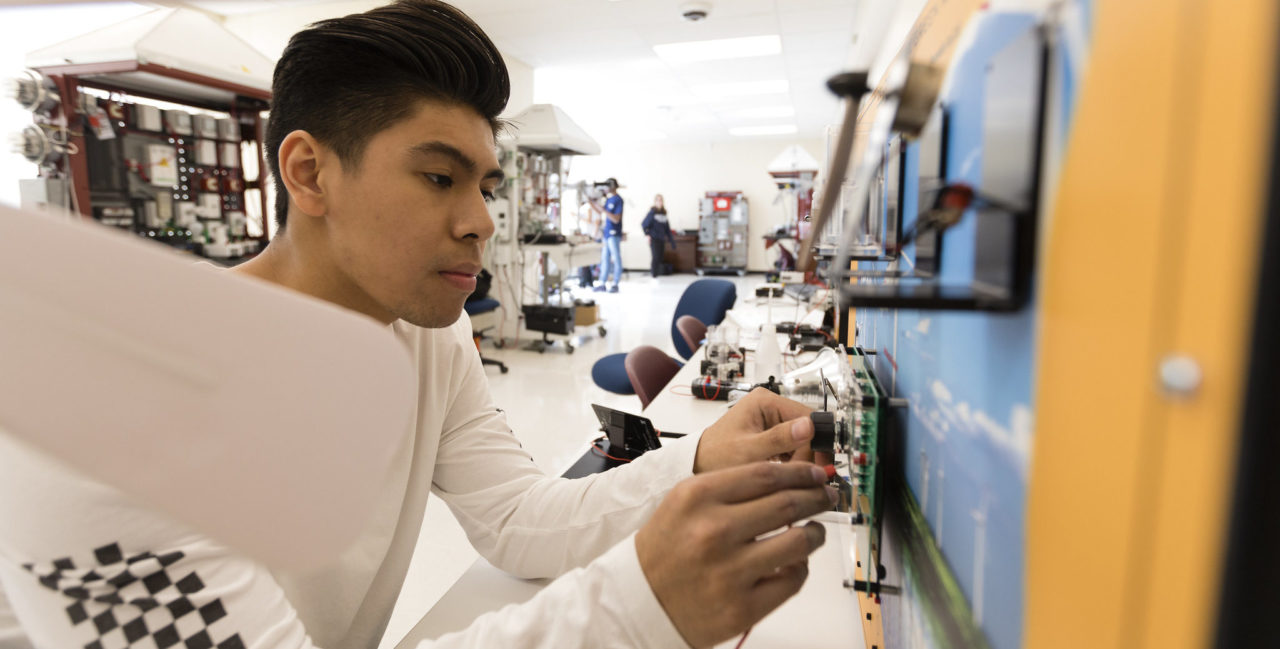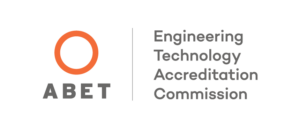Mechanical Engineering Technology BSMET

The Bachelor of Science in Mechanical Engineering Technology curriculum requires the successful completion of 120 credits. It includes mathematics, basic sciences, English composition and communications, humanities and social sciences, and technical courses. The curriculum consists of an integrated sequence of undergraduate courses emphasizing the application of engineering and scientific knowledge, methods, technology and technical skills appropriate to the discipline.
The program prepares students to apply the principles of mechanics and energy to the design, manufacturing and operation of machinery and other mechanical devices. Employment opportunities for mechanical engineering technologists are in power generation, process control, production supervision, plant operation, manufacturing, quality assurance and reliability testing, test and field services, automotive industry, heating, ventilating and air conditioning.
Professional Accreditation

The B.S. in Mechanical Engineering Technology program is accredited by the Engineering Technology Accreditation Commission of ABET, https://www.abet.org.
Educational Objectives
The educational objectives of the B.S. in Mechanical Engineering Technology program define the career and professional accomplishments that the graduates are being prepared to achieve three to four years after graduation. The program will produce graduates who:
- Enter into and advance their careers in the analysis, applied design, development, implementation and management of mechanical systems and processes, including those used in fields such as mechanical design, electromechanical devices and controls, manufacturing processes and applied thermal-fluid sciences.
- Continue their formal education leading to professional licensures or advanced degrees in science, technology or business.
- Continue to conduct themselves as both responsible professionals and global citizens who are aware of and who understand ethical issues and societal needs and problems.
These objectives are consistent with the mission of Fairleigh Dickinson University to educate and prepare students as world citizens through global education. They also fulfill the needs of the program constituencies, which include students, alumni, employers, faculty, and the Industrial Advisory Board.
Student Outcomes
Each mechanical engineering technology graduate will demonstrate the following attributes and achievements as required by the ETAC of ABET upon or before graduation:
- An ability to apply knowledge, techniques, skills and modern tools of mathematics, science, engineering, and technology to solve broadly-defined engineering problems appropriate to the discipline;
- An ability to design systems, components, or processes meeting specified needs for broadly-defined engineering problems appropriate to the discipline;
- An ability to apply written, oral, and graphical communication in broadly-defined technical and non-technical environments; and an ability to identify and use appropriate technical literature;
- An ability to conduct standard tests, measurements, and experiments and to analyze and interpret the results to improve processes; and
- An ability to function effectively as a member as well as a leader on technical teams.
Cooperative Education or Work Experience Option
Students in the B.S. in Mechanical Engineering Technology program have the option to undertake a cooperative education experience and earn a total of 6 academic credits toward their technical electives. The co-op experience provides students a real-world grounding, linking theory and practice, academic and industrial experiences, and college education and lifelong learning. It better prepares students for jobs, gives them a competitive edge in the job market, helps them develop networking skills and professional contacts and allows them to experience career fields before graduation. Industry benefits from better-prepared graduates with real and relevant work experience – saving time and money by reducing the training period for new employees.
Instead of undertaking cooperative education, students may earn up to 6 academic credits for appropriately documented industrial experience (Work Experience) counted toward their technical electives. Note that credits earned from industrial experience and/or cooperative education may not be substituted for any required course work and that they altogether may not exceed a total of six credits. Students must have successfully completed the course EGTG2210 Technical Communications before the application for “Work Experience” credits can be considered. The application form and directions for submission of necessary documents in support of the application may be obtained from the office of GHSCSE.
Degree Plan
The program requires the successful completion of 120 credits with a minimum cumulative grade point ratio of 2.00 as described below.
1st Semester (15 credits)
- ENGR1301 Engineering Practices, Graphics and Design (3 credits)
- MATH1107 Precalculus (4 credits)
- PHYS2101 General Physics I (3 credits)
- PHYS2201 Lab: Physics I (1 credit)
- UNIV1001 Transitioning to University Life (1 credit)
- WRIT1002 Composition I: Rhetoric and Inquiry (3 credits)
2nd Semester (14 credits)
- EGTC1223 Introduction to CAD (2 credits)
- MATH1201 Calculus I (4 credits)
- PHYS2102 General Physics II (3 credits)
- PHYS2202 Lab: Physics II (1 credit)
- UNIV1002 Preparing for Professional Life (1 credit)
- WRIT1003 Composition II: Research and Argument (3 credits)
3rd Semester (17 credits)
- CHEM1201 General Chemistry I (3 credits)
- CHEM1203 General Chemistry Laboratory I (1 credit)
- EGTG2215 Circuits I (3 credits)
- EGTG2221 Statics (3 credits)
- MATH2202 Calculus II (4 credits)
- EGTC3261 Estimating I (3 credits )
4th Semester (15 credits)
- EGTE2216 Circuits II (3 credits)
- EGTG2228 Strength of Materials (3 credits)
- EGTG4221 Engineering Statistics and Reliability (3 credits)
- ENGR1204 Programming Languages in Engineering (3 credits)
- EGTG2210 Technical Communications (3 credits)
5th Semester (15 credits)
- EENG4375 Electrical Energy Conversion (3 credits)
- EGTG2265 Electronics I (3 credits)
- EGTG3211 Materials Technology I (3 credits)
- EGTG4254 Fluid Mechanics (3 credits)
- EGTM2232 Mechanical Measurement and Devices (3 credits)
6th Semester (15 credits)
- EGTG3351 Applied Thermodynamics (3 credits)
- EGTG3431 Dynamics (3 credits)
- EGTM2235 Manufacturing Processes (3 credits)
- ENGR3000 Modern Technologies: Principles, Applications and Impacts (3 credits)
- EGTG4225 Industrial Automation (3 credits)
7th Semester (15 credits)
- EGTC4263 Project Management and Control I (3 credits)
- EGTG4224 Process and Electro/Mechanical Control Systems Technology (3 credits)
- EGTG4269 Management and Engineering Economics (3 credits)
- EGTM3248 Mechanical Technology Design I (3 credits)
- UNIV2001 Cross Cultural Perspectives (3 credits)
8th Semester (14 credits)
- EGTM3250 Mechanical Technology Design II (3 credits)
- EGTM4386 Mechanical Tech Design Proj. (2 credits)
- Technical Electives (6 credits)
- UNIV2002 Global Issues (3 credits)
Technical Electives: The student must take 6 credits of technical electives, to be chosen from the following:
- CHEM1202, CHEM1204 General Chemistry II Lecture (3 credits) and Laboratory (1 credit)
- EGTC4260 Contracts and Specifications (3 credits)
- EGTC4264 Project Management & Control II (3 credits)
- EGTE4047 Optical Technology I (3 credits)
- EGTE4049 Optical Technology II (3 credits)
- EGTG4340 Manufacturing Systems (3 credits)
- EGTM4040 Heating, Ventilation, Air Conditioning (3 credits)
- EGTM4041 Heating, Ventilation, Air Conditioning and Refrigeration Controls (3 credits)
- EGTG2286 Digital System Design (3 credits)
- EGTG3223 Instrumentation (3 credits)
- EGTM4356 Stress and Vibration Analysis (3 credits)
Other technical electives may be taken with prior approval from the GHSCSE Director or their designee. Up to 6 credits for work experience or cooperative education experience but not both may be used in place of technical electives.
Mechanical Engineering Technology Minor
(for Non-Mechanical Engineering Technology and non-Mechanical Engineering Majors)
The minor in mechanical engineering technology consists of 15 credits, and it is available to qualified students. This minor provides students with a foundation in mechanical engineering technology, and it can enhance their employment opportunities and career options.
Program Enrollment and Degree Data
The official fall term enrollments of the B.S. in Mechanical Engineering Technology program for the last five academic years and the number of degrees conferred during each of those years.
|
|
Academic Year |
Enrollment Year |
Total
|
Degrees Awarded |
|||||
|
1st |
2nd |
3rd |
4th |
|
|
||||
|
Current Year |
2025-2024 |
FT |
1 |
3 |
4 |
2 |
10 |
Not yet available |
|
|
PT |
|
|
|
|
|
||||
|
1
|
2024-2023 |
FT |
3 |
5 |
2 |
4 |
14 |
8 |
|
|
PT |
1 |
|
|
1 |
2 |
||||
|
2
|
2023-2022 |
FT |
8 |
1 |
6 |
6 |
21 |
8 |
|
|
PT |
|
|
|
|
|
||||
|
3
|
2022-2021 |
FT |
5 |
10 |
5 |
5 |
25 |
5 |
|
|
PT |
|
|
|
2 |
2 |
||||
|
4
|
2021-2020 |
FT |
13 |
1 |
3 |
3 |
20 |
3 |
|
|
PT |
|
|
1 |
2 |
3 |
||||
FT- full-time, PT- part-time